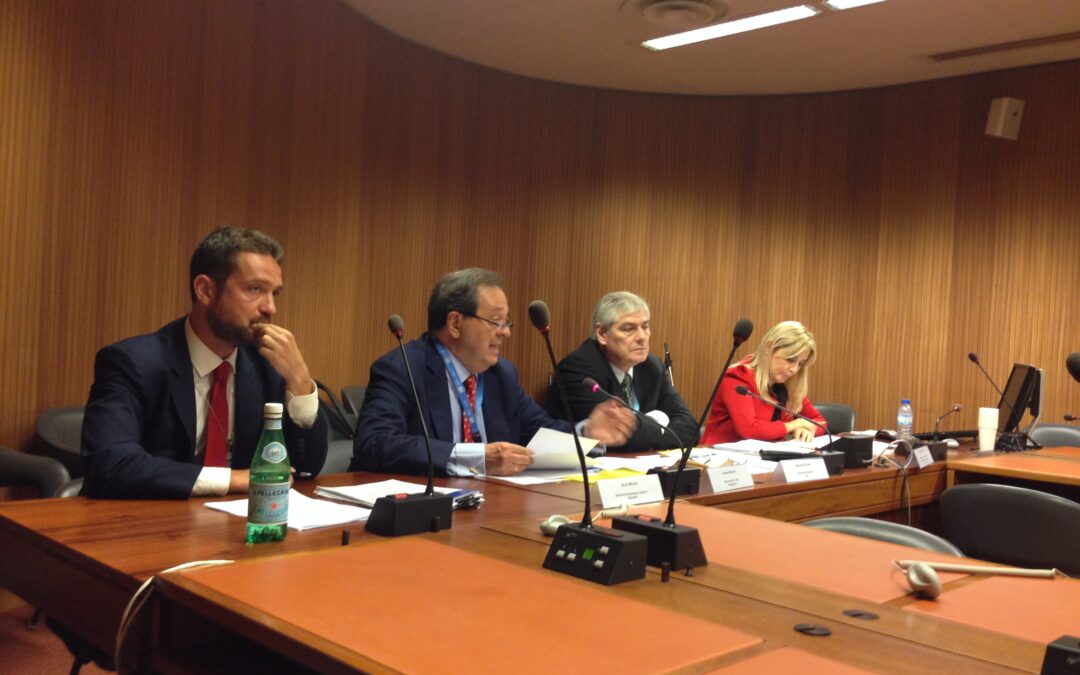
Jul 1, 2014 | Events, Uncategorized
The ICJ’s Director of International Law and Protection Programmes, Alex Conte, today addressed the Human Dimension Committee of the Organization for Security and Co-operation in Europe (OSCE) on the subject of human rights and terrorist listing and sanctions regimes.
The ICJ’s intervention:
- Provided an overview of the procedures for the listing and delisting of individuals or entities in the sanctions lists of the Security Council’s Al-Qaida and Taliban Sanctions Committee;
- Outlined the legal challenges and implications concerning the relationship between human rights and relevant Security Council resolutions, emphasising that regional courts have held States to account for any violation of human rights, irrespective of whether this comes about as a result of implementing Security Council listing and sanctions resolutions; and
- Identified some minimum safeguards applicable by States in their implementation of sanctions.

Jun 27, 2014 | Agendas, Events
The ICJ is today holding an expert roundtable on asylum claims based on sexual orientation, gender identity or expression.
Participants include asylum judges and lawyers; officials from national refugee status determination authorities, the Office of the UN High Commissioner for Refugees and the Office of the UN High Commissioner for Human Rights; asylum academics; and staff members from other NGOs, including the Organization for Refuge, Asylum & Migration (ORAM), the Human Dignity Trust (HDT), the Advice on Individual Rights in Europe (AIRE) Centre and the Belgian Refugee Council.
At the roundtable, taking place in Brussels, participants will discuss: the legal challenges and responses in the context of asylum claims based on sexual orientation, gender identity or expression and refugee law; reflections on the UNHCR’s Guidelines on International Protection No. 9: Claims to refugee status based on Sexual Orientation and/or Gender Identity; the concept of persecution and assessment of evidence in the context of those claims; and the relevance of European human rights law to asylum claims based on sexual orientation, gender identity or expression.
The programme of the expert roundtable can be downloaded here.
This roundtable forms part of a broader project of the ICJ on international protection claims based on sexual orientation, gender identity or expression. The ICJ’s commentary on the related CJEU judgment in X, Y and Z v The Netherlands can be downloaded here.

Jun 20, 2014 | Events
The ICJ’s International Legal Adviser, Reema Omer, participated in a panel discussion on ‘Rule of Law in Bangladesh’, convened on 19 June 2014 in the margins of the Human Rights Council’s 26th regular session in Geneva.
The event was co-sponsored by the Asian Legal Resource Centre, CIVICUS, FIDH, OMCT and Human Rights Watch and was moderated by Mr Mandeep Tiwana, Head of Policy and Research for CIVICUS. Panelists included Mr Adilur Rahman Khan, Secretary of Odhikar; Mr M.D. Ashrafuzzaman, Urgent Appeals Programme Coordinator of the Asian Legal Resource Centre; Mr Gerald Staberock, Secretary General of OMCT; and Ms Reema Omer, International Legal Adviser of the ICJ’s Asia Pacific Regional Programme.
The ICJ’s intervention focussed on the incompatibility of the Bangladesh Information and Communication Technology Act 2006 (ICTA) and its 2013 amendments with international human rights law and standards. Based on the ICJ’s briefing paper on the ICTA from November 2013, and referring to recent cases, Reema Omer highlighted how the Act and its amendments amount to an assault on the freedom of expression and a stifling of public discourse. Her intervention also spoke of the judiciary’s responsibility to prevent such attacks on freedom of expression.
Bangladesh-ICT-Brief-2013 (download the ICJ’s briefing paper on the ICTA)
ICJ press release of 20 November 2013 concerning the ICTA

Jun 15, 2014 | Events
On 14 June 2014, the ICJ convened an international seminar on the rights of the child, the business sector and the international legal framework.
The one-day seminar took place in the context of the efforts by the ICJ and other organisations to assist in the implementation of General Comment No 16 of the Committee of the Rights of the Child on State obligations regarding the impact of the business sector on children’s rights. Participants included members of the Committee, staff of the Office of the High Commissioner for Human Rights, UNICEF, the ILO and NGO representatives in the domain.
A summary of the seminar and main interventions is now available.
ICJ Seminar on Business and Children’s Rights – June 14 (download in PDF)

Jun 11, 2014 | Events
The ICJ’s Senior Legal Adviser on women’s human rights participated in a panel discussion on ‘Gains, gaps and challenges in addressing violence against women’, convened on 10 June 2014 in the margins of the Human Rights Council’s 26th regular session in Geneva.
The event was co-sponsored by the Office of the High Commissioner for Human Rights (OHCHR) and the Permanent Missions of Canada and Chile and was moderated by Jane Connors, Chief of the OHCHR Special Procedures Branch. Panelists included Rashida Manjoo, Special Rapporteur on violence against women; Her Excellency Elisa Goldberg, Ambassador of Canada; Her Excellency Marta Maurás Peréz, Ambassador of Chile; and Leah Hoctor, ICJ Senior Legal Adviser.
The ICJ’s intervention focussed on remaining challenges, including the lack of prompt and effective investigations into allegations of violence against women (VAW); systemic failures in some States’ implementation of their due diligence obligations; and a series of disconnects at the international level pertaining to the link between VAW and other forms of discrimination and rights violations that women face, the lack of a holistic conceptualisation and treatment of VAW, and the insufficient integration of legal and normative progress in the discussions and approach of international fora.

Jun 11, 2014 | Events
The ICJ and the International Bar Association (IBA) co-sponsored a side event to the 26th session of the Human Rights Council, on Wednesday 11 June 2014, on Strengthening the Rule of Law in Venezuela.










